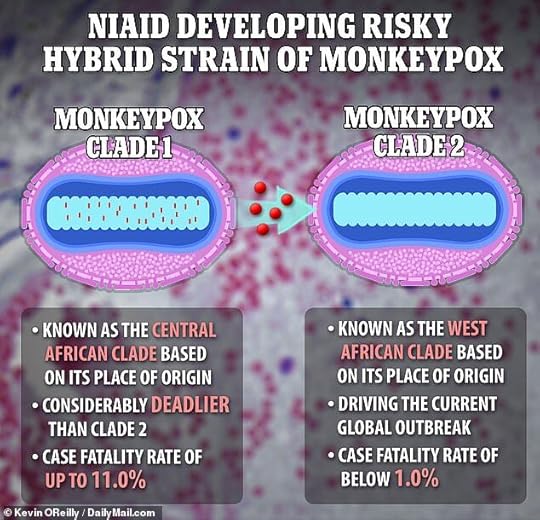Government lab in Maryland plans to create a hybrid monkeypox strain that is MORE deadly than one currently spreading in US

By
NIAID research will see experts swap genes between two monkeypox strains They will attempt to make currently dominant clade more lethal and infect mice The aim of the project is to spur the development of better drugs for humans But it comes amid growing concern about virus manipulation research in labs DailyMail.com exposed last week how a hybrid Covid virus was made in BostonA Government laboratory in Maryland plans to make the circulating monkeypox strain more lethal in highly controversial research in mice.
The team wants to equip the dominant clade – which mostly causes a rash and flu-like symptoms – with genes from another strain that causes severe disease.
They hope the experiment will reveal how different genes make monkeypox more deadly, and spur the development of better drugs and vaccines for humans.
It comes just a week after DailyMail.com revealed a similar experiment involving a hybrid Covid strain was conducted at Boston University.
The latest monkeypox study is being funded by the National Institute of Allergy and Infectious Diseases (NIAID), a research arm of National Institutes of Health (NIH).
But the modified virus ‘poses an exceptionally high risk’ to the public if it accidentally leaks, according to Dr Richard Ebright, a microbiologist at Rutgers University in New Jersey.
The team in Maryland would argue their work does not involve ‘enhancing’ a pathogen because they are swapping natural mutations rather than creating new ones, meaning the hybrid cannot be more deadly than the existing clades.
But the news will no doubt surprise many Americans that such research continues to go on in the US despite fears similar practices may have started the pandemic.
There have been more than 27,000 cases of monkeypox in the US since the current outbreak took hold earlier this year
The Maryland study will involve extracting dozens genes from the more severe clade 1 monkeypox virus and putting them into the less virulent clade 2 virus. They will then infect mice with the hybrid virus and monitor how the disease progresses
The Maryland team’s work is being led by NIAID scientist Bernard Moss at the agency’s headquarters in Bethesda.
This phase of the study will involve extracting dozens genes from the more severe clade 1 monkeypox virus and putting them into the milder clade 2 virus.
They will then infect mice with the hybrid virus and monitor how the disease progresses.
The team had initially attempted the reverse: swapping genetic materials in the less virulent clade into clade 1 to make it less deadly, but without success.
The current global outbreak is confirmed to be driven by clade 2, the less deadly West African monkeypox strain, which has a mortality rate of less than one percent.
Clade 1, meanwhile, kills one in 10 people it infects. It has its origins in the Democratic Republic of the Congo and primarily spreads in the Congo Basin.
Biden promises to crackdown on virus manipulation research
The White House announced plans to crackdown on viruses manipulation research only days after DailyMail.com uncovered similar research being undertaken at Boston University.
In a national biodefense strategy unveiled last week, the Biden Administration laid out plans to prevent and respond to future biological disaster situations like the COVID-19 pandemic.
The report highlights the risk of ‘accidental biological threats’ caused by accidents in biosafety labs which work with dangerous pathogens.
Last Monday, DailyMail.com revealed that Boston University’s National Emerging Infectious Diseases Laboratories, had developed a hybrid strain of Covid with an 80 per cent lethality rate in mice.
Researchers defended the work, claiming it could advance our understanding of Covid and how to treat and vaccinate against it, but critics warn the benefits do not outweigh the risk of a potential leak.
Biden’s biosafety plans, which were published two days later on October 19, says the ‘United States has a responsibility to ensure our technology, development, and assistance programs do not exacerbate this risk [a lab leak] unintentionally’.
The White House report also accepts that the ‘risk of laboratory accidents may be increasing with the rise in the number of laboratories around the world conducting high-risk life sciences research and research with potential pandemic pathogens’.
There is no suggestion that the report is a response to the work at Boston University, and DailyMail.com has approached the White House for comment.
But the report gives a nod to the potential dangers of so-called ‘gain of function’ research, when a virus is enhanced to be more dangerous or infectious so scientists can get ahead of potential outbreaks or develop therapies.
Boston University has argued that their research was not gain of function, as the original wild strain killed 100 per cent of mice exposed to it, which they argue means their work actually reduced the lethality of the virus.
Researchers equipped the original Wuhan strain of Covid with Omicron’s spike protein – the part which helps it invade cells and makes it more infectious. Critics say the combination of increased infectiousness and lethality made it dangerous.
The Maryland experiment was exempt from oversight when it was given the green light in 2018 because monkeypox did not meet the threshold for a ‘potential pandemic pathogen’.
[…]
The Most Revolutionary Act
- Stuart Jeanne Bramhall's profile
- 11 followers



